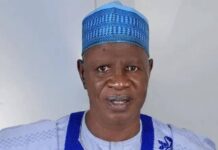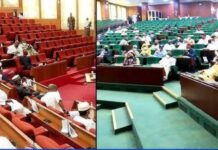Wage raise and tradeoff between macroeconomic variables, by Uji A.Iliyasu
The battle between Federal Government and the organised labour has been raging for decades. The Nigerian labour or the workforce want higher wages to cope with the current economic realities, but the government feels reluctant to agree to their demand.
The labourforce feel that they are short-changed when they compare their take-home pay with those of the lawmakers in the National Assembly.
Unfortunately we are aware of the jumbo pay for the nation’s lawmakers, but methinks there is no basis for the comparison given the onerous task at the table of the legislators and the responsibility for those who hang upon their pulse in their constituencies.
Also, the number of lawmakers in the National Assembly and the state Houses of Assembly added, may not have been up to one per cent of the total population.
We must note that in implementing government policies, there must be some tradeoff between macroeconomic variables.
Thus, to increase the wages of Nigerian workers is an illusive drive for their welfare. Increased salary means higher inflationary trend that will finally crash the national economy if care is not taken.
Higher wages bring about the reduction in the workforce by employers in the private sectors, especially those who cannot cope with the trend, thereby institutionalising unemployment or disguised unemployment in the society.
If the national inflation at the end of the day takes the much-touted minimum wage, why should we then kill in order to get wads of notes that will be useless in the market?
Now the state governors say they cannot pay the minimum wage beyond N60,000, because there will be nothing left for infrastructural development and social services such as good hospitals, roads, power, education, and the like.
I expect the union leaders of Nigeria Labour Congress (NLC) and Trade Union Congress (TUC) to prevail on government to reduce the pump price of petroleum motor spirit (PMS) and to provide enabling environment for artisans and small-scale businesses to thrive; reach agreement with the federal government to encourage domestic production in order to solve the problem of unfavourable balance of trade.
Again, the unionists should fight for Nigerian farmers to get from government fertilisers and improved seedlings and high breeding animal species for crop and livestock farmers, respectively, for increased domestic productivity.
READ ALSO: In defence of the naira as CBN fights back, by Adefolarin A Olamilekan
We fail to remember that after independence, our currency was almost 60 dollars to one naira, particularly in 1972. The reason is that our farmers produced the foods we needed. Our industries produced the goods and even vehicles we used.
Then we had Peugeot Assembly Plant in kaduna, we had Dunlop Tyres and Steyr Trucks in Lagos; we had Bata Shoes in Lagos, Port Harcourt, Enugu and other cities, and many more.
All these companies have folded up due to enervating business climate, After that we developed a penchant for foreign goods and services on a journey of no return.
The demand for wage raise by the organised labour leaders is tantamount to ignorance of the macroeconomic variables like unemployment, inflation, saving and investment as well as balance of trade.
Can we not see that Nigeria’s woes started from the payment of Udoji salary awards to Nigerian workers? After the Udoji awards in the 1970s, too much money began to pursue too few goods and services leading to hyperinflation.
Nigerians, after tasting the luxuries money can buy, became lazy and unproductive.
If for instance, every Nigerian gets a million naira transfer payment or what some people proudly call palliative, by the morning tomorrow, every individual will feel too big to run their former businesses and would like to buy their needs from their neighbours who equally feel too big to rise to their trades.
It is unfortunate that Nigerians are wont to heap blames on their leaders. We fail to understand that the economic climate that made former Presidents Olusegun Obasanjp, Musa Yar’Adua or Goodluck Jonathan good leaders are no longer present in the current domestic economy.
Obasanjo, Yar’Adua or Jonathan are Tinubu and Tinubu is them. I don’t think as most compatriots think about the insensitivity of President Tinubu; I still doubt if a true president of a nation will enjoy the luxury of sleep while citizens wallow in penury. Unless he is a sadist, which I think Tinubu is not.
A rising cost of living is a global phenomenon. It is not peculiar to Nigeria.
Also, there is no basis for comparing dollar and naira. With 1000 naira, an average Nigerian can eat in a roadside restaurant to his fill.
Can an average American fill his stomach with the dollar equivalent of 1000 naira?
Labour will have greater support base if they prevail on government to reduce cost of governance, task federal legislators to make laws to discourage corruption in public offices, prevail on the National Assembly to enact laws that will solve the lingering herders/farmers clashes and instill patriotism in youths by creating employment opportunities for them.
If this is done, the huge chunk of taxpayers’ money that is being wasted yearly on insurgency, banditry and other forms of violent crimes will be channeled to developmental purposes. This will free the huge annual security budgets to other pressing needs of all Nigerians.
Uji A. ILIYASU is Features Editor with Neptune Prime, Abuja.
Follow the Neptune Prime channel on WhatsApp:
Do you have breaking news, interview request, opinion, suggestion, or want your event covered? Email us at neptuneprime2233@gmail.com





